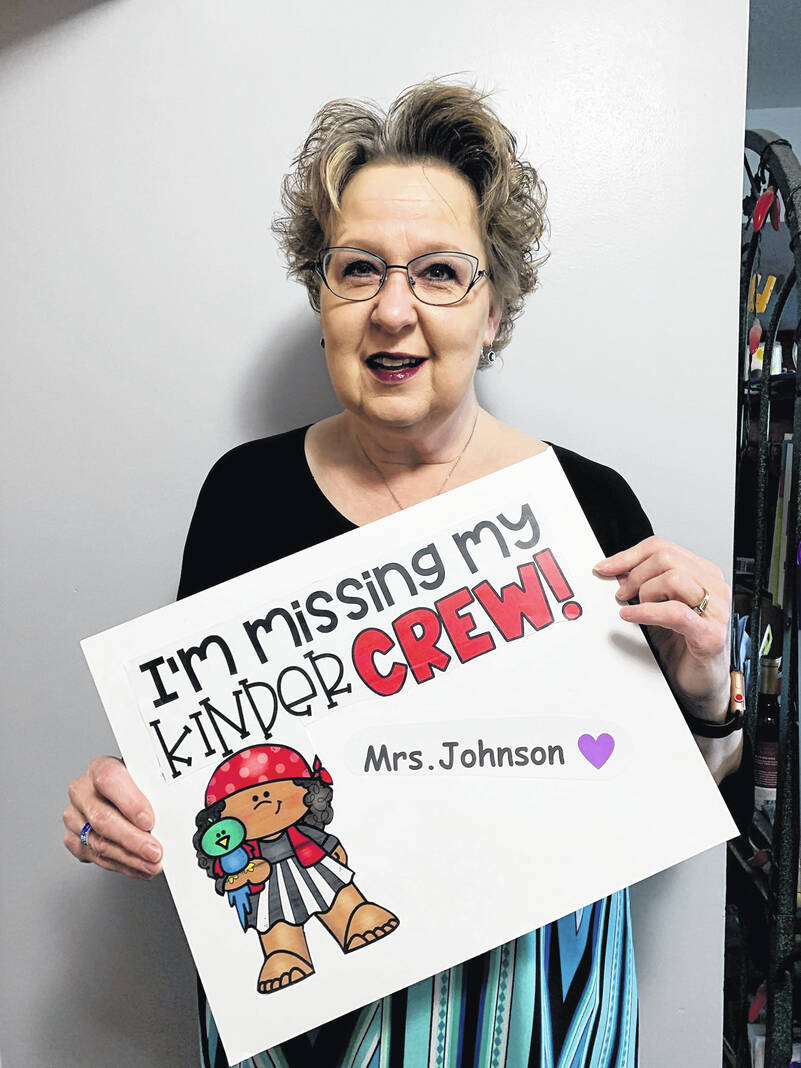
Shown is retired Sidney City Schools kindergarten teacher Annette Johnson.
Courtesy photo
SIDNEY — Annette Johnson is a retired kindergarten teacher who has received a plasma infusion every four weeks since she was diagnosed with primary immunodeficiency in 2016. She thanks blood donors for helping her “go back in the world” and spend precious time with her “kinder crew.”
“If people didn’t do this, I would have had to stop teaching,” she said. “For teachers, it isn’t just a job. It is who you are. When we get up in the morning you’re going to your classroom, you’re going to be there for your kids.”
Annette spent 25 years with Sidney City Schools, taught at four different schools, and retired in December 2021 from Emerson Primary. “It was hard to leave,” she said, but it was time.
“There was something that was not right,” she said. Four months after retiring she was diagnosed with cancer and underwent a partial mastectomy followed by radiation treatment. “I would have been gone a long time. I couldn’t be the kind of teacher my students need.”
She is thankful her cancer was caught early, and for her plasma treatments. “Being able to face the cancer and know my immune system is not going to be a problem makes me more of a typical patient,” she said.
She considers it a miracle that her teaching career did not end years earlier. From September 2015 to January 2016, she spent 39 days in and out of the hospital. Blood tests revealed her immune system deficiency.
“I started infusions and have not been back to the hospital for that since then,” said Annette. “It was like flicking a switch for me. I’m like people who get sick and can fight off infection like everyone else. For me it was that dramatic.”
Every four weeks she spends about five hours receiving treatment. “The plasma infusions never stop,” she said. “It’s even more important. A few years ago, there was a shortage and there was a concern there wouldn’t be enough. It’s scary to think that I’m not going to get my infusion this month. I always have to have it.”
Like her fellow teaches, she weathered the challenges of the pandemic, remote teaching during lock-downs with the message, “I’m missing my kinder crew,” and carefully avoiding COVID infection. She rejoiced with the return of in-person teaching.
“By helping me you’re helping my students by letting me teach a little longer,” was her message to donors. “I was able to be back in my class and be back with my kids. When you donate plasma, you’re able to keep me in the classroom so I can take care of my students.”
She now devotes her time to a new grandson, and in helping others. “I feel compelled to volunteer at the Foodbank,” she said. “When I see people who are being helped it makes it more important, I show up and do what I can.”
Plasma is the liquid portion of the blood that maintains blood pressure and supplies critical proteins for blood clotting and immunity. Plasma donations commonly goes to trauma and burn patient but is especially vital for treating people with chronic conditions like Annette’s.
“I was just grateful to keep teaching as long as I did,” she said. “Plasma donations aren’t always going for a surgery or an accident. There are people getting it so they can go on.
“It doesn’t cancel my life. People who donate plasma helped me go back in the world and be like everybody else.”
Blood donation requirements: Donors are required to provide a photo ID that includes their full name. Past CBC donors are also asked to bring their CBC donor ID card. Donors must be at least 17 years of age (16 years old with parental consent: form available at www.givingblood.org or at the Dayton CBC and mobile blood drive locations), weigh a minimum of 110 pounds (you may have to weigh more depending on your height), and be in good physical health. The Food and Drug Administration (FDA) changes blood donor eligibility guidelines periodically. Individuals with eligibility questions can email [email protected] or call (937) 461-3220. Make an appointment at www.DonorTime.com.
Community Blood Center/Community Tissue Services® is an independent, not-for-profit organization. Community Blood Center provides blood products to partner hospitals and health centers within its 18-county service area of western Ohio and eastern Indiana and to select hospitals and blood centers outside the region. For more information visit www.givingblood.org.




